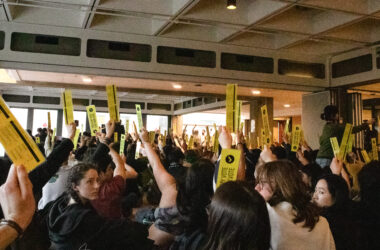On Nov. 19, roughly 20 students met over Zoom for a candidates’ debate as a part of the by-election to fill vacancies in the Vice-President (VP) Student Life and VP Operations and Sustainability executive positions at the Students’ Society of McGill University (SSMU). This election follows the resignations of the former VP Student Life and current VP Operations and Sustainability, Chloé Muñoz and Meg Baltes, respectively. The voting period began on Nov. 20 and will continue until Nov. 29.
The debate started with opening statements from candidates for the VP Student Life position—Alice Postovskiy, U3 Arts, and Justice Bongiovanni, U1 Arts. The opening statements were followed by a brief Q&A period.
During the debate, Postovskiy expressed plans to actively support services and clubs with simplified finances and procedures, bring student groups together, and ensure better communication from SSMU. Postovskiy highlighted her involvement in student life at McGill, particularly in the Union for Gender Empowerment, a SSMU service.
“I’ve seen how much community and support means to students, […] we support each other,” Postovskiy said. “I’ve worked to make things easier for student groups at SSMU, in the Services Committee, and also directly collaborating with the previous two Vice-Presidents Student Life.”
In Bongiovanni’s opening statement, he highlighted the diversity of McGill’s student body and explained his plans to make dietary-restricted and culturally-appropriate foods more accessible on campus. Bongiovanni also underlined the lack of support for certain groups that require more community centres, stating that it is possible to achieve this with proper coordination.
“My action plan includes five integral steps: Reopening student-run cafés and employ[ing] more students at those cafés and cooperatives. We want to also support more food cooperatives, invest over $10,000 [CAD] in the food security programs […] and we have several of them already available,” Bongiovanni said.
In the second part of the debate, candidates for the position of VP Operations and Sustainability, Arya Cheuk, U1 Arts and Science, and Kareem El Hosini, U3 Engineering, took questions and explained their visions for the role.
Cheuk, Sustainability Officer of the McGill Undergraduate Geography Society (MUGS), explained that accessibility is a major issue on campus. In addition, Cheuk repeated her objective for a greener McGill, and described her past initiatives towards this goal, such as implementing compost bins at the Burnside Building.
“I want to re-emphasize my desire to make McGill a leader in sustainability,” Cheuk said. “I’ve seen that this is possible in the past as we’ve seen the divestment of fossil fuels in the Carbon Underground 200 list that happened in 2022, and I wish to bring back this level of solidarity and unison within the student body to enact climate change mitigation policies.”
Next, El Hosini explained that his platform is based on three principles: Efficiency, transparency, and enrichment. El Hosini is also committed to increasing the accessibility of services and resources provided by SSMU for students.
“My goal is to make use of all of the SSMU,” El Hosini said. “[To] give as [many] resources as possible to the students and be able to bring in more accessible revenue-generating businesses to the SSMU where we can create value [for] the students there, where they can enjoy the space and feel welcomed.”
El Hosini also underlined how his experience in operations and logistics from previous engineering internships would enhance his focus on efficiency in the role.
In an interview with The Tribune, SSMU President Dymetri Taylor explained that while SSMU has organized candidate debates for previous elections, student attendance has been minimal, in part due to a lack of effective advertisement. For Taylor, the debate is unlikely to significantly increase voter turnout and engagement with the by-election more broadly, but he hopes to introduce more clear frameworks around the debates to make the events more standardized in the future.
“I don’t believe the debates [system] in its current context will really hit what it could. I think it needs to have that structure behind it,” Taylor said.









